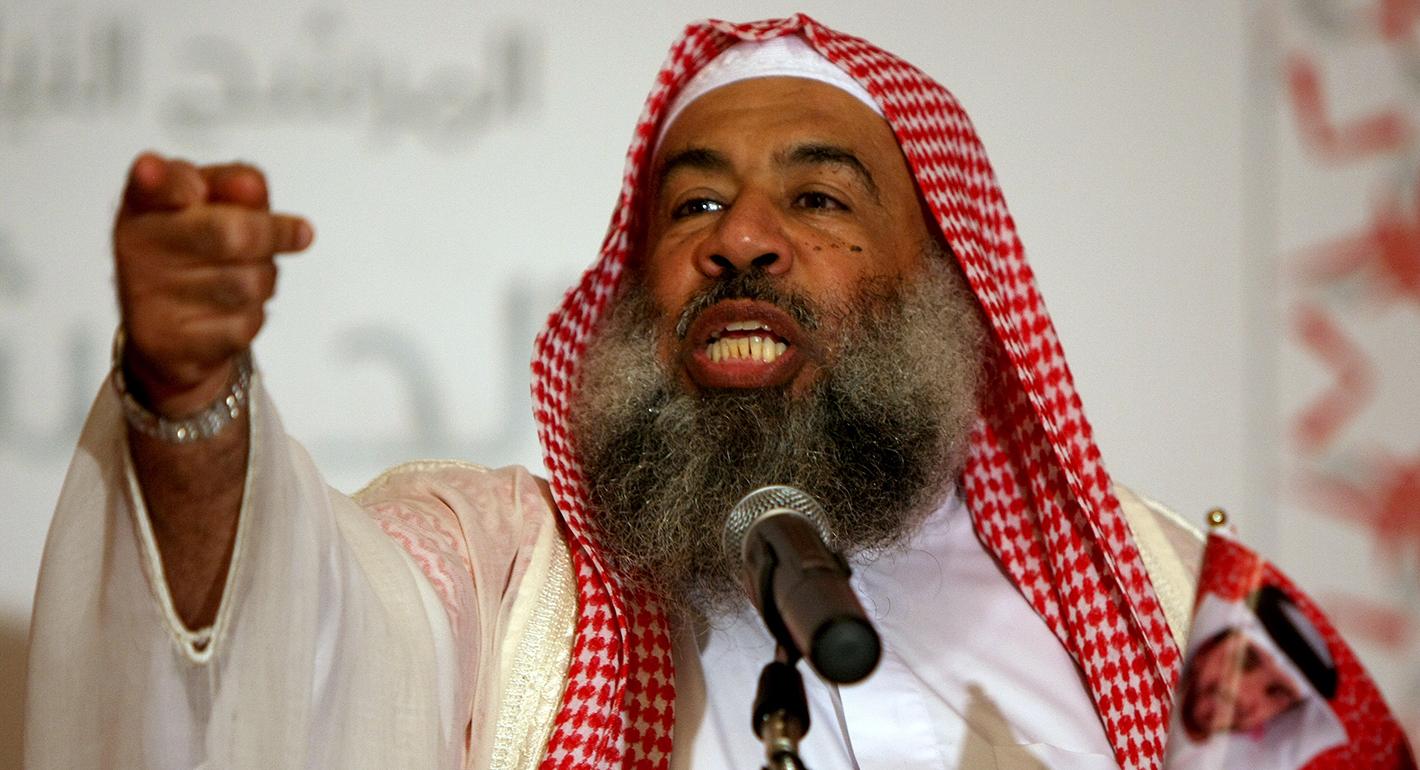Baku may allow radical nationalists to publicly discuss “reunification” with Azeri Iranians, but the president and key officials prefer not to comment publicly on the protests in Iran.
Bashir Kitachaev

Source: Getty
In the face of poor election results for the last five years, Bahrain’s Sunni Islamists have fallen back on the loyalism and political quiescence common to oil-rich states.
The position of Sunni Islamist groups in Bahrain is an underexamined aspect of the country’s domestic politics, as most inquiries have focused on the rift between the Sunni ruling family and a largely Shia opposition movement. These sectarian dynamics have prompted Sunni Islamist movements in Bahrain, whether the Muslim Brotherhood or Salafi groups, to align politically with the government; since 2011, state authorities have even made efforts to mobilize these groups against Shia protests. Nonetheless, both the Muslim Brotherhood and Salafis have struggled to formulate agendas independent of regime interests, and have lost political capital among their supporters in the kingdom as a consequence, as shown in their poorer outcomes in the 2014 and 2018 elections.
As a result, Bahrain’s Sunni Islamists increasingly have fallen back on the loyalism and political quiescence common to oil-rich states. This mindset makes such movements less likely to push for reforms in the context of a united Sunni bloc, which could further accelerate their decline in relevance to Bahraini political life. Following the chaos of the Arab Spring in Bahrain, both the Brotherhood and the leading Salafi organization have struggled to separate themselves from the regime, and their domestic setbacks are amplified by international backlash against Sunni Islamist groups (specifically, the isolation of the Muslim Brotherhood following the ouster of Egypt’s Mohamed Morsi and, by extension, diplomatic crises in Qatar and Turkey).
While geopolitical concerns certainly have affected Sunni Islamist agendas in Bahrain, these agendas also often serve as domestic foils to Shia opposition movements that have been more successful in mobilizing support. Nevertheless, the grievances that drove the post-2011 protests are not strictly linked to sectarian divisions, and political agendas cannot be divided along these lines. Although many loyalists are Sunni, some Shia families also support the government, meaning that economic marginalization is not based on sectarian differences but instead reflects Bahrain’s uneven development overall and “a political economy based on the exclusion of the majority and the rewarding of a minority of loyalists.”1 By portraying the 2011 uprisings as Shia-led, however, the Bahraini government helped discourage cross-sectarian political cooperation.
Bahrain’s Sunni Islamist environment is dominated by the Muslim Brotherhood and one main Salafi organization, al-Asala. The country’s Muslim Brotherhood appears to be highly localized, rather than part of a transnational movement, particularly in the aftermath of the Arab Spring. Its agenda is therefore shaped by national context and a good relationship with the ruling Al Khalifa family, rather than ideology or any imagined connection to a transnational organization. Al-Asala, by contrast, appears to be linked (at least through ideology and personal ties) to Saudi quietist Salafi networks. Although all Salafi groups aim to purify society to align it with the earliest Islamic teachings, quietist Salafism is focused on ritual purity and education on the teachings of Salafism, rather than political issues. Despite this traditional understanding of quietist Salafism, al-Asala has become more localized and more politically active, similar to the activist strands of Salafism found elsewhere in the Middle East. By examining the Sunni political landscape in Bahrain and tracing government efforts to penetrate the Sunni Islamist sphere, it is possible to better understand how these dynamics have been affecting Bahrain’s Sunni Islamists today.
The Bahraini Muslim Brotherhood was the first branch established in the Gulf Cooperation Council, founded in 1941 as the Students’ Club and renamed Jamiyyat al-Islah, or the Reform Society, in 1948. Until the early 2000s, the Bahraini Brotherhood primarily was involved in charity and education but also took on some political stances, mainly against Arab nationalists and Shia Islamists, particularly during the period of protests in favor of domestic political reform between 1994 and 1999. At the time, the regime welcomed these stances since they provided support for the government’s position, in the face of mounting political challengers agitating for political reform.2 In 2002, the Bahraini Muslim Brotherhood established Jamiyyat al-Minbar al-Watani al-Islami (al-Minbar National Islamic Society, or simply al-Minbar) as its political wing, and for more than a decade it had at least one seat in parliament, until it failed to secure a seat in the 2018 elections. In parliament, al-Minbar has tended to support the monarchy’s political and economic agenda while also pressing for the implementation of Islamist social policies like restrictions on the sale of alcohol. Its base of support is mainly the urban middle class and civil servants, and many members are in government decisionmaking bodies, especially for education.3 Its primary policy demands tend toward generic support for the security services and protection of the current situation.
Many Brotherhood members are from the Hawala tribe, and traditionally have been part of the merchant elite, so they have a vested interest in maintaining the political status quo. Members of al-Minbar most often hold positions in Bahrain’s parliament, education system, security apparatus, and judiciary. The Bahrain government’s ties to the Muslim Brotherhood are thought to be so strong that it is rumored that Bahrain’s royal court and Islamic banking sector bankroll the group. The current king’s uncle, former labor and social affairs minister Isa bin Muhammad Al Khalifa, was involved in the founding of the Reform Society and headed it from 1963 to 2013.4 Through these high-level links, the organization has become a reliable part of the rentier bargain, trading political access for its members’ quiescence and loyalty. In spite of these loyalist leanings, in 2005 al-Minbar did cooperate with leading Shia opposition bloc al-Wefaq to encourage the reform of land ownership laws. However, this move was ultimately pragmatic—it protected merchants’ economic interests and their part of the rentier bargain, or package of state-provided benefits—rather than a symptom of any change in agenda or desire to engage in cross-sectarian coalitions, as Bahrain’s primary Salafi political bloc has done.
The al-Asala Islamic Society, Bahrain’s most prominent Salafi organization, was established in 2002. It is the political arm of the Salafi charity group Islamic Education Society, which was created in the 1990s and has attracted support from “poorer and more tribal Sunnis from Muharraq and al-Rifa’ as well as among naturalized Bahrainis.”5 Many of its members are involved in the Ministry of Justice, Islamic Affairs, and Endowments.6 Al-Asala is considered ideologically proximate to Saudi quietist Salafis, who generally oppose taking stands against the government and thus are considered “a pawn of the royal family’s interests.” Compared to al-Minbar, al-Asala enjoys greater support from Sunni members of the tribal population, specifically those from the smaller cities of Muharraq and al-Rifa’, as well as members of security forces, who tend to voice social rather than political criticism. Like al-Minbar, and unlike truly quietist Salafis, al-Asala has at times criticized the government, even voting with the Shia al-Wefaq to demand certain reforms to limit the king and central government’s control. On the whole, though, it has never sustained an agenda independent of the ruling family, and instead has focused on preserving Sunni representation in parliament. Its participation in the legislature thus makes it not strictly speaking purist, yet its positive alignment toward the government has led it to be placed with that camp ideologically.
Overall, there has been limited cooperation between the Brotherhood and Salafis. The Brotherhood’s more conciliatory stance toward Shias has caused some tension, and outright antagonism emerged in 2002 when the Salafis refused to swear allegiance to the Bahraini Constitution based on their belief that the Quran is the only legitimate source of law.7 In 2006, however, al-Minbar and al-Asala resolved not to run candidates in the same constituencies in order to enhance the Sunni Islamist vote, leading the Brotherhood to win seven seats and al-Asala eight.8 Although this cooperation was not sustained in the 2010 polls, in 2006 the regime actively encouraged it, as it helped to isolate hardliners among the Salafi movement and combat a growing liberal-Shia alliance. Al-Minbar and al-Asala cooperation also ramped up for a limited period during the height of the Arab Spring uprisings. The regime encouraged this cooperation as well, seeking to isolate the Shia opposition movement by creating a new loyalist organization that would mitigate the Sunni groups’ poor showings in the 2010 parliamentary elections. Ultimately, even this cooperation failed when domestic and regional political calculations shifted with the Arab Spring.
Because the Bahraini regime presented the Arab Spring–inspired protests in the country as Shia-led, Sunni Islamists became an important base of support for the government. The regime actively promoted this dynamic, primarily by helping to create an umbrella organization for Sunni Islamists. Government encouragement led to the creation of the National Unity Gathering (NUG) in February 2011, which came to be seen as an alternative Islamist forum to the Arab Spring protests, one that advocated for gradual political reforms rather than major, sweeping changes. The NUG thus positioned itself as a third option between Shia protesters and Sunni elites linked to the ruling family, insisting that this constituency was voicing its own demands.9 In March 2011, it held meetings with opposition groups, including the Shia al-Wefaq movement, to demand political reform and the end of sectarianism, but under government pressure it adopted increasingly loyalist positions. It also lost the critical support of al-Minbar and al-Asala after neither group had members elected to the NUG’s steering committee, leading both groups to withdraw their support from the forum.10
What Justin Gengler has dubbed “Bahrain’s Sunni awakening” demonstrated that “for their nearly unwavering support, and for their help in keeping the government’s fiercest critics at bay, ordinary Sunnis expect something in return.” Logically, the government was eager to support such mobilization, since it added credibility to the narrative that the protests were primarily Shia-driven. When the government became less concerned about its survival, however, it became less reliant on loyalist Sunni groups, and so there were few efforts to revive the NUG when it lost momentum at the end of 2011. The 2011 parliamentary by-elections reflected disillusionment among Bahraini Sunnis in general with their political societies, as well as efforts within al-Minbar in particular to rebuild after its 2010 defeats when it and al-Asala failed to coordinate in elections. Ultimately, neither the Brotherhood nor al-Asala participated in the elections; rather, they stated that they would tacitly support certain candidates, thus allowing more room for independent candidates to succeed.
The November 2014 elections showed the extent to which the shifts in domestic and regional politics had left Bahrain’s Sunni voters at a disadvantage and its Sunni political movements unable to find a secure footing. The government had redrawn electoral districts ahead of the polls, demonstrating, in Marc Valeri’s words, “the reluctance of the regime to have a parliament controlled by Islamists (either Shia or Sunni) and of its strategy of favoring pragmatic businessmen and tribal leaders ready to support the regime’s policies.”11 It is therefore no coincidence that the redistricting seemed to affect Sunni Islamist groups more than it affected al-Wefaq; indeed, the redistricting, which was implemented after first Saudi Arabia and then the UAE designated the Muslim Brotherhood a terrorist organization, obviously aided tribal independents over Sunni Islamists. Districts in the Sunni-majority southern part of the country were increased in size, thus disadvantaging candidates with local support bases, and the districts of many incumbent Sunni Islamist members of parliament (MPs) were combined with others. Even though al-Minbar and al-Asala had been helpful domestic partners for the embattled regime during the Arab Spring, as the policies of Riyadh and Abu Dhabi increasingly turned against Sunni Islamists, it became more difficult for the Bahraini authorities to justify their closeness with such groups, particularly the Muslim Brotherhood.
The Sunni political scene also had a new player; in January 2012, young NUG supporters had sought to create another Sunni counterrevolutionary force, called the Fatih Awakening (Sahwat al-Fatih). The Fatih Awakening adamantly opposed any dialogue between the regime and al-Wefaq, describing the latter as “terrorists,”12 a move that appeared to indicate its intended stance as a more genuine third way between the Shia opposition and the regime-backed Sunni parties. Based on its poor results in the November 2014 elections, however, the Fatih Awakening ultimately failed to mobilize sufficient support independent of the government—which had been its goal in leaving what it considered the loyalist NUG—and the Brotherhood.
In the elections, al-Minbar and the NUG had agreed not to present candidates in the same constituencies, but al-Asala did not follow their lead, and the electoral divisions had disastrous results for the Sunni Islamists. The smaller groups were decimated: none of the NUG’s seven candidates was successful, and al-Fatih also failed to win any of the ten seats it contested. Meanwhile, al-Minbar won one seat and al-Asala won two seats, while thirty-six seats went to independents. The NUG’s failure in elections demonstrated the degree to which it, like al-Fatih, had not managed to create an independent agenda within the Bahraini political scene. In short, the 2014 elections demonstrated the extent to which Sunni Islamists had failed to reach the expectations of their constituents, exacerbated by their own internal struggles and the (potentially intended) effects of the government’s redistricting.
The post-2011 period, though initially hopeful for Muslim Brotherhood affiliates throughout the Middle East, led to a widespread crackdown or at least vilification in the aftermath of the fall of the Mohamed Morsi government in Egypt in July 2013. Sunni groups of the Brotherhood and Salafi strands were notably important in rallying support for the Bahraini government during Arab Spring protests. Yet in the space of a few months in 2014, Saudi Arabia and the UAE declared the Muslim Brotherhood a terrorist group, placing Bahrain in an awkward position, as the Brotherhood’s local political branch held seats in parliament. Rather than specifically outlawing the organization, the Bahraini government claimed that it had a “special status,” according to the country’s foreign minister in 2017, while the Brotherhood itself was vocal in backing many government decisions that have proven detrimental to Sunni Islamists elsewhere.
In 2014, Bahraini Foreign Affairs Minister Khaled bin Ahmed Al Khalifa explained that his country did not consider the Brotherhood “a global movement,” which has been a key criticism of the organization from states like Saudi Arabia and the UAE which have banned it. In 2017, after the start of the Gulf crisis, he explained that his government does “consider the Muslim Brotherhood a terrorist group and anyone who shows sympathy with them will be tried on this basis.” To date, however, no one in Bahrain has been prosecuted on this basis, perhaps because the Bahraini Brotherhood responded tactfully to changes in the region. Al-Minbar, the Bahraini Brotherhood’s political arm, issued a statement in June 2017 in favor of “the strenuous efforts led by the Kingdom of Saudi Arabia to unify the stances of all Islamic states that attended the Riyadh summit, which isolated the Iranian regime and laid bare its terrorist and sectarian-tainted tactics in the international arena,” while also affirming its adherence to moderate Islamic thought.
The November 2018 parliamentary elections confirmed the political retreat of Sunni Islamists. The elections were held in a tightly controlled political environment, with the opposition boycotting the polls after many of their members were banned from participating. Notably, al-Minbar, which held two seats in the previous assembly, failed to win a single seat for the first time since its creation. Al-Asala, meanwhile, managed to win three seats, and the NUG won its first ever seat as well, leaving these four seats the sole representatives of organized Sunni blocs. This newly elected parliament, which houses only three incumbents, also features primarily independents—a testament to the perceived failure of existing political groups, though this outcome also threatens to make the assembly more susceptible to government control. Just two weeks after the election, MPs from al-Asala led the charge in calling for crackdowns on “gay sheesha havens,” suggesting that what Sunni bloc does exist will focus on social, rather than political, issues in parliament.
The introduction of a law in May 2016 banning any preacher from being a member of any political society or engaging in political activities explicitly shows the Bahraini government’s efforts to separate religion and politics, reflecting its concerns about the potency of Islamist thought, whether Shia or Sunni. Loyalist Sunni Islamists have been helpful to the regime during the uprisings, but these groups “have been unable to propose a sustainable post-2011 Sunni Islamist platform immune from the regime’s manipulation,” as Valeri put it.13Sunni Islamism had thus effectively “served its purpose of arresting the momentum of opposition demonstrations in 2011,” and thus could be discarded. The longer these cross-ideological Sunni groups operated, the likelier they would adopt independent agendas objectionable to the government.
Marc Valeri further highlights that the regime’s emphasis on the sectarian divide during the Arab Spring helped drive Salafi jihadism within Bahrain, a strand of Islamism particularly hostile toward Shia Muslims.14 Al-Asala has faced scrutiny for supporting militant groups in Syria; in particular, a delegation of al-Asala MPs traveled to Syria in August 2012 to give donations to the Islamist Suqour al-Sham brigade, later the Islamic Front. Although this trend of support for Syria may have slowed in recent years, anti-Shia rhetoric undoubtedly continues.
Bahrain’s leading Sunni Islamist blocs appear to have retreated to the safety of loyalism rather than promoting intra-Sunni unity to press for substantive political reforms. They have again become part of the rentier system, exchanging political independence for political access and economic privilege in a regional environment where Sunni Islamists are in an increasingly precarious position. As Justin Gengler points out, Bahrain’s Sunni community “receives a disproportionate share of state largesse and thus stands to lose the most from cuts to public-sector salaries and other benefits” because it is so critical to the survival of the regime. In addition to rentier calculations, dissent has become increasingly associated with Shia mobilization, making it more difficult to mobilize Sunni groups against the regime. The rentier model remains alive and well in Bahrain, notwithstanding limited calls for changes in social policy in the current parliament.
Courtney Freer is a research fellow in the Middle East Center at the London School of Economics and Political Science. In 2018, she published Rentier Islamism: The Influence of the Muslim Brotherhood in Gulf Monarchies (Oxford University Press).
1 Toby Matthiesen, “Sectarianization as Securitization: Identity Politics and Counter-Revolution in Bahrain,” in Sectarianization: Mapping the New Politics of the Middle East, eds. Nader Hashemi and Danny Postel (Oxford: Oxford University Press, 2017), 213.
2 Marc Valeri, “Islamist Political Societies in Bahrain: Collateral Victims of the 2011 Popular Uprising,” in Islamists and the Politics of the Arab Uprisings: Governance, Pluralisation and Contention, eds. Hendrik Kraetzschmar and Paola Rivetti (Edinburgh: Edinburgh University Press, 2018),168
3 Ibid, 168.
4 Ibid., 168.
5 Ibid., 169.
6 Ibid., 169.
7 Frederic M. Wehrey, Sectarian Politics in the Gulf: From the Iraq War to the Arab Uprisings (New York: Columbia University Press, 2014), 62.
8 Valeri, “Islamist Political Societies in Bahrain,” 170.
9 Ibid., 172.
10 Ibid., 174.
11 Ibid., 176.
12 Ibid., 175.
13 Ibid., 178.
14 Ibid., 175–6.
Carnegie does not take institutional positions on public policy issues; the views represented herein are those of the author(s) and do not necessarily reflect the views of Carnegie, its staff, or its trustees.
Baku may allow radical nationalists to publicly discuss “reunification” with Azeri Iranians, but the president and key officials prefer not to comment publicly on the protests in Iran.

Bashir Kitachaev
The story of a has-been politician apparently caught red-handed is intersecting with the larger forces at work in the Ukrainian parliament.

Konstantin Skorkin
This time, though, they’re adding even more pressure to an already beleaguered regime.

Eric Lob
It’s one thing to export Russian helicopters to Iran to fight the insurgency, and it’s easy to imagine Moscow becoming a haven for fleeing Iranian leaders. But it’s very difficult to imagine Russian troops defending the Iranian regime on the ground.

Nikita Smagin
While appointing Kyrylo Budanov will help shore up Zelensky’s political authority and balance the president’s inner circle, the spy chief’s political ambitions mean he could be a threat.

Konstantin Skorkin